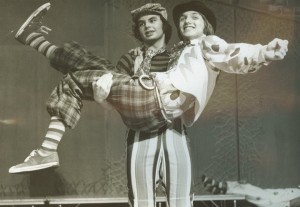By John Gilstrap
I used to be fairly addicted to James Lipton’s show Inside the Actor’s Studio, during which he would conduct incisive interviews with famous actors. It used to come on every Sunday night, but got shuffled in the schedule a while ago, and I’ve not been able to catch up with it again. The stories of creative courage, and of success in the face of repeated rejection inspired me. I think the show was inspiring to anyone of a creative bent.
Back in high school, I used to toy with the idea of becoming an actor—having been a star in our production of Godspell and learning to love the sound of applause. (I’m the holder in the picture, not the holdee) Then I was cast as George in the school’s production of Our Town, and I realized that I was far too self-conscious to strip away the social armor of adolescence and show real emotion to a room full of strangers. I went through the motions because that was what I’d signed on to do, but acting was not for me.
I chose instead to do my emoting on the page, where I have the luxury of limitless attempts to get it exactly the way I want before I show it to anyone. It’s part of my nature as a control freak.
While the up-by-the-bootstraps stories were inspiring, I also took great interest in the guests’ discussion of method acting, in which actors insert themselves emotionally into their character’s reality, and then leverage their own emotional and sensory memory to deliver a convincing performance. The Method, as it is called, contrasts with “classical” acting, in which actors merely simulate their characters’ emotions through external factors such as voice and facial expression. (Thanks to Wikipedia for the definitions.)
We talk a lot about point of view here at The Killzone, and for me, there’s a lot to be learned about POV by what little I understand about The Method. I’ve never articulated it as such, but when I write any given scene, I am in the emotional space of the character to whom the scene belongs. I see and hear what they see and hear. When I’m truly in the zone, writing a scene is merely a matter of reporting what I see and what I feel. I can be that much in the moment.
To the degree that I have a gift for writing (how’s that for a pretentious phrase?), I think that gift lies in my ability to bring readers into my characters’ heads. I’d been writing that way for long before I watched my first episode of Inside the Actor’s Studio and learned about The Method, but the more I think about it, the more I believe that the processes are similar.
As I write this, I realize that there’s also a writing analogy to the classical style of acting. It manifests itself in the writing styles of many of the titans of the mystery genre, starting with the Great Agatha. While I enjoy her stories, I never feel terribly bonded to her characters emotionally. I admire them for their puzzle-solving abilities, but I don’t feel that I know them personally. (Having written this paragraph, why do I feel like I should be digging a bunker to hide in?) As a result, those stories feel dated to me.
What about you, fellow Killzoners? Do you think there’s a link between acting and writing?

